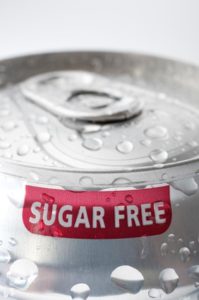Do Diet Sodas Increase Your Risk Of Stroke?
Author: Dr. Stephen Chaney
 Is diet soda bad for you? With over two third of Americans overweight or obese, it is clear that we are in a midst of an obesity epidemic. Multiple studies have shown that over consumption of sugar-sweetened beverages (soft drinks, energy drinks, and “fruit” juices that aren’t made from real fruit) are major drivers of the obesity epidemic. Because of these trends, many experts recommend substituting artificially sweetened beverages for sugar-sweetened beverages in the American diet.
Is diet soda bad for you? With over two third of Americans overweight or obese, it is clear that we are in a midst of an obesity epidemic. Multiple studies have shown that over consumption of sugar-sweetened beverages (soft drinks, energy drinks, and “fruit” juices that aren’t made from real fruit) are major drivers of the obesity epidemic. Because of these trends, many experts recommend substituting artificially sweetened beverages for sugar-sweetened beverages in the American diet.
Is that advice sound? Do diet sodas help prevent weight gain? Are they safe? The answers to those questions are not as clear as you might expect.
Do Diet Sodas Prevent Weight Gain?
 The answer to that question would seem to be a no-brainer. Substituting beverages with no calories for beverages with calories should lead to less weight gain. However, as I summarized in a previous “Health Tips From the Professor” article Do Diet Sodas Make You Fat, the answer is not clear at all. Some studies suggest that diet sodas help people lose weight. Other studies suggest diet sodas cause just as much weight gain as sugar-sweetened sodas.
The answer to that question would seem to be a no-brainer. Substituting beverages with no calories for beverages with calories should lead to less weight gain. However, as I summarized in a previous “Health Tips From the Professor” article Do Diet Sodas Make You Fat, the answer is not clear at all. Some studies suggest that diet sodas help people lose weight. Other studies suggest diet sodas cause just as much weight gain as sugar-sweetened sodas.
With so much confusion in the literature, what should we believe? More importantly, what do the experts say? This January an international consortium of experts reviewed all of the pertinent literature and published a position paper on whether artificially sweetened beverages were of value in responding to the global obesity crisis (Borges et al, PLOS Medicine, DOI: 10.1371/journal.pmed.1002195).
These authors concluded:
- “In summary, the available evidence…does not consistently demonstrate that artificially-sweetened beverages are effective for weight loss or preventing metabolic abnormalities [pre-diabetes and diabetes]. Evidence on the impact of artificially-sweetened beverages on child health is even more limited and inconclusive than in adults.”
- “The absence of evidence to support the role of artificially sweetened beverages in preventing weight gain and the lack of studies on their long-term effects on health strengthen the position that artificially-sweetened beverages should not be promoted as part of a healthy diet.”
Is Diet Soda Bad For You?
 As if the lack of proven efficacy weren’t bad enough, other studies suggest that diet sodas may also be bad for your health. In previous issues of “Health Tips From the Professor,” I have discussed other studies showing that diet sodas are just as likely as regular sodas to increase risk of diabetes Artificial Sweeteners and Diabetes and heart disease Soft Drinks and Heart Disease.
As if the lack of proven efficacy weren’t bad enough, other studies suggest that diet sodas may also be bad for your health. In previous issues of “Health Tips From the Professor,” I have discussed other studies showing that diet sodas are just as likely as regular sodas to increase risk of diabetes Artificial Sweeteners and Diabetes and heart disease Soft Drinks and Heart Disease.
Even worse, a study published earlier this month (Pase et al, Stroke, DOI: 10.1161/STROKE.AHA.116.016027 ) concluded that diet sodas may significantly increase the risk of stroke and Alzheimer’s disease.
This study looked at 2888 participants of the Framingham Heart Study. The participants evaluated for risk of stroke had a mean age of 62 on enrollment. Those evaluated for risk of dementia had a mean age of 69 on enrollment. All subjects were followed for 10 years. Three food frequency questionnaires were administered during that 10-year period to evaluate consumption of diet and sugar-sweetened sodas. The results of the study were:
- People consuming at least one diet soda per day over a 10-year period were 3X more likely to have a stroke or develop dementia (primarily Alzheimer’s disease) than people consuming no diet sodas.
- No increased risk of stroke or dementia was seen for people consuming sugar-sweetened beverages. However, that does not mean that sugar-sweetened beverages are good for you. Previous studies have shown they increase the risk of obesity and diabetes.
- When the data were corrected for hypertension, cardiovascular disease, and obesity (waist to hip ratio), diet sodas still increased the risk of having a stroke by 2.6-fold.
- This is not the only study to show a link between diet sodas and stroke. Two other studies have come to the same conclusion, and in both of those studies the increased risk was also seen only with diet soda consumption, not with sugar-sweetened soda consumption.
The author of the study concluded by saying: “As the consumption of artificially sweetened soft drinks is increasing in our community, along with the prevalence of stroke and dementia, future research is needed to replicate our findings and to investigate the mechanisms underlying the reported association.”
I agree. Current evidence does not definitively prove that diet sodas cause stroke and Alzheimer’s, but these are life-changing adverse health outcomes. Further research to test this association is desperately needed to know whether or not diet soda is bad for you.
Are Diet Sodas Safe and Effective?
 As you might expect these studies have caused quite a bit of controversy. Some experts have embraced these studies and have concluded that health professionals should stop recommending diet sodas as a safe and effective alternative to sugar-sweetened sodas.
As you might expect these studies have caused quite a bit of controversy. Some experts have embraced these studies and have concluded that health professionals should stop recommending diet sodas as a safe and effective alternative to sugar-sweetened sodas.
Others have been unwilling to change their recommendation of diet sodas for people who are obese and/or diabetic. Their rationale is 3-fold:
- These studies merely show that diet soda consumption is associated with weight gain, diabetes, heart disease, stroke and Alzheimer’s. Association does not prove causation, so their viewpoint is that there is no conclusive proof that diet sodas cause weight gain and health risks.
- The obesity epidemic is a major health crisis, and consumption of sugar-sweetened beverages plays an important role in weight gain.
- They are convinced that most people are so addicted to the sweet taste of sugar that they would be unwilling to switch to calorie free options like water or herbal teas.
In short, they are desperately clinging to the hope that substituting diet sodas for sugar-sweetened sodas will put a dent in the obesity crises because they don’t believe there are any other viable options.
What Do These Studies Mean For You?
I side with those experts who have looked at the data from the opposite perspective and concluded there is no convincing evidence that diet sodas are either safe or effective.
If the conversation were just centered around weight gain, diabetes, and heart disease, this could be considered an academic discussion. One could argue that diet sodas might have some benefit, and, at the worst, would have the same health risks as the regular sodas they replaced.
However, the possibility that diet sodas may increase the risk of stroke and dementia is a game-changer in my mind. That’s because consumption of sugar-sweetened sodas does not appear to increase the risk of either stroke or dementia. If true, that means that substitution of diet sodas for sugar-sweetened sodas is not a neutral substitution. It could cause serious harm.
With no good evidence that diet sodas help people control weight and the possibility that they may have serious health risks, it is difficult to see how anyone in good conscience can continue to recommend diet sodas in place of regular sodas.
My recommendation is to substitute water and other unsweetened beverages for the sugar sweetened beverages you are currently consuming. If you crave the fizz of sodas, drink carbonated water. If you need more taste, try herbal teas or infuse water with slices of lemon, lime, or your favorite fruit. If you buy commercial brands of flavored water, check the labels carefully. They may contain sugars or artificial sweeteners. Those you want to avoid.
So, is diet soda bad for you? Well, it’s not good for you.
The Bottom Line
- This January an international consortium of experts reviewed all of the pertinent literature and concluded: “The available evidence…does not consistently demonstrate that artificially-sweetened beverages are effective for weight loss or preventing metabolic abnormalities. The absence of evidence to support the role of artificially sweetened beverages in preventing weight gain and the lack of studies on other long-term effects on health strengthen the position that artificially-sweetened beverages should not be promoted as part of a healthy diet.”
- This April a study was published reporting that people consuming at least one diet soda per day over a 10-year period were 3X more likely to have a stroke or develop dementia (primarily Alzheimer’s disease) than people consuming no diet sodas. Two other studies on the effect of diet sodas on the risk of stroke have come to similar conclusions.
- We cannot yet say definitively that diet sodas cause stroke and dementia. Further research is clearly needed to test these associations. However, at this point it is safe to say there is no convincing evidence that diet sodas are either safe or effective.
- With no good evidence that diet sodas help people control weight and the possibility that they may have serious health risks, it is difficult to see how anyone in good conscience can continue to recommend diet sodas as a substitute for sugar-sweetened sodas.
- My recommendation is to substitute water and other unsweetened beverages for the sugar sweetened beverages you are currently consuming. If you crave the fizz of sodas, drink carbonated water. If you need more taste, try herbal teas or infuse water with slices of lemon, lime, or your favorite fruit. If you buy commercial brands of flavored water, check the labels carefully. They may contain sugars or artificial sweeteners. Those you want to avoid.
- For a more nuanced discussion of this issue, read the article above.
These statements have not been evaluated by the Food and Drug Administration. This information is not intended to diagnose, treat, cure or prevent any disease.
